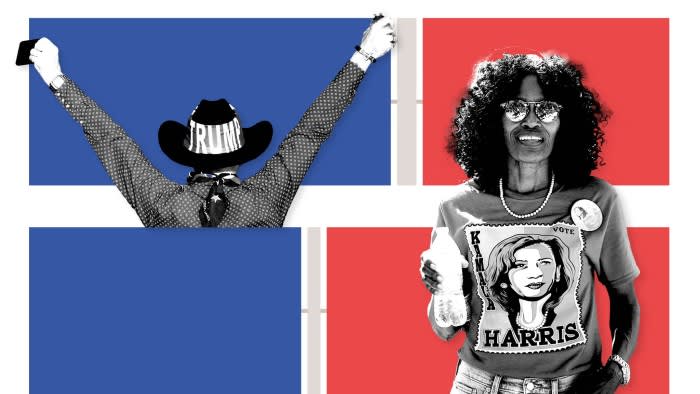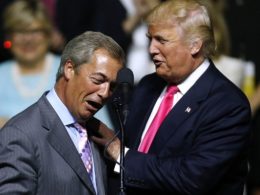After a Donald Trump campaign event in the heart of Savannah, Georgia, in late September, Kamala Harris supporters stood in a small square to protest under the city’s moss-covered live oak trees.
“I’ve honestly never been into politics until I realised that I can do something about it and have a voice,” said Kyri Titus, a student at the Savannah College of Art and Design.
She was not “against Republicans” generally but had been turned off by Trump “and what he stands for” in her first election as a voter. “I’m just figuring out what’s best for me, being a woman, being 20 years old.”
Inside the nearby Johnny Mercer Theatre, judgments of Harris were scathing.
“You can’t put anything on the positive tally sheet, it’s all negative,” said Tommy Brown, a 72-year-old former car body repairman who was a contractor in Afghanistan and is backing the former president. “She’s a joke, she’s a hyena, laughing all the time. Has no solutions.”
On Tuesday, Americans will finally make their choice between Harris and Trump. The country’s great divisions, along racial, educational and — above all — gender grounds will be laid bare.
The biggest division could be over gender — and it may decide the election.

Women have been flocking to Harris — who would be the first female US president if elected and has been buoyed by star-studded endorsements including Beyoncé and Taylor Swift — on the back of her vows to protect reproductive freedom.
But men have increasingly turned to Trump, who has tapped into male anxieties and grievances, as well as traditional concerns about immigration and the economy. He has also projected himself as sharing their pastimes, from golf to the Ultimate Fighting Championship.
Trump brought in wrestling star Hulk Hogan to speak at the Republican convention, struck a political bromance with billionaire Elon Musk, and spent three hours of free-ranging discussion on the podcast hosted by Joe Rogan, who has a vast male following across America.
While figures vary across polls, one from NBC last week showed Harris beating Trump by a margin of 57 per cent to 41 per cent among women, but Trump leading Harris by 58 per cent to 40 per cent among men.

At one of Harris’s final campaign rallies on Sunday in East Lansing, Michigan, Deborah Matlock, a 58-year-old supply chain analyst had waited three hours to watch the vice-president speak, and was thinking of her own daughters.
“They need abortion rights. They need female healthcare,” she said. “It feels very life and death.”
Trump has not helped himself on the issue. He struggled to distance himself from Dobbs, the landmark Supreme Court ruling in 2022 that overturned Roe vs Wade, which had protected nationwide abortion rights for decades.
The decision was written by a majority of conservative justices including three of Trump’s own appointees. On the campaign trail, Trump has repeatedly made bizarre, macho pledges to “protect women” — saying last week that he would do so “whether they like it or not”.
FT Edit
This article was featured in FT Edit, a daily selection of eight stories to inform, inspire and delight, free to read for 30 days. Explore FT Edit here ➼
“[Trump] just really hasn’t changed the game to win over any more women, and if past is prologue, that is not good for him, because women are the most reliable voters,” said Kelly Dittmar, director of research at Rutgers University’s Center for American Women and Politics.
Talk of women secretly supporting Harris while their husbands and partners backed Trump has spread like wildfire across the campaign.
“[A friend] told me that a friend of hers who voted for Trump in ‘16 and ‘20 whispered to her over lunch that she is now quietly voting for the vice-president and me,” Elissa Slotkin, a Democratic candidate for Senate in Michigan, wrote on her Facebook page on Sunday. “She thinks there are a lot more folks just like her.”
Trump allies say the gender gap is wildly exaggerated.
“When people walk into the voting booth, it’s about self-preservation,” said Amy Kremer, a conservative activist from Georgia. “I can assure you that when women can’t put a roof over their head, or food on their table, if a woman has nowhere to live or is living in a park, I can guarantee you she’s not concerned about abortion.”
Kremer’s comments point to America’s other big faultline in this election: education. According to a Pew Research Center poll, Harris has the backing of 53 per cent of college-educated voters in the US, compared with 42 per cent who favour Trump. The Republican comfortably wins the support of Americans with at most a high school diploma, by a margin of 56 to 39 per cent.
Trump has been able to make inroads with working-class voters by touting populist stances on economics — including tariffs on imports to protect local manufacturing and eliminating taxes on tips and overtime pay — and more isolationist stances on foreign policy.

Harris supporters believe Trump is a phoney champion of struggling Americans, citing his plans for deep spending cuts, his opposition to expanding labour rights and his plans to extend tax cuts for the wealthy and large companies.
His first presidency “was a disaster, the economy tanked, he mishandled the Covid pandemic and killed thousands of Americans”, said Craig Edgin, a 62-year-old retiree at Harris’s Michigan rally on Sunday.
America’s racial divide endures too. According to Pew, 55 per cent of white Americans back Trump and 41 per cent support Harris. She is backed by a big majority of Black voters and smaller majorities of Asian-American and Hispanic voters.

But another feature of the 2024 election has been the attempt by the campaigns to conquer new territory. In a shift to the middle, for example, Harris has campaigned openly with anti-Trump Republicans, including Liz Cheney, the former congresswoman and daughter of Dick Cheney, vice-president to George W Bush.
“Kamala Harris has done all she needs to do to get those folks,” said Geoff Duncan, the former Republican lieutenant-governor of Georgia who has been campaigning for her. They won’t vote for Trump, he added, but the question remained whether they would turn up for Harris.
Trump, meanwhile, has courted Black people, disaffected Latinos and Arab Americans angry about US policy in the Middle East — though the racist rhetoric at his recent Madison Square Garden rally could yet undermine that effort.

Back in Savannah, Bernadette Hogan, another first-time voter at Georgia Southern University, was keen on the Republican.
“I really like his policies, he doesn’t have any BS,” she said, as she raced to take her seat for his event. “I think he could fix this country.”
Data visualisation by Jana Tauschinski, Martin Stabe, Jonathan Vincent and John Burn-Murdoch
Source link










